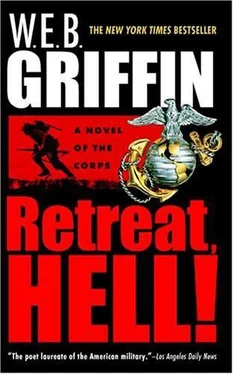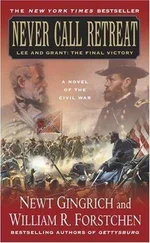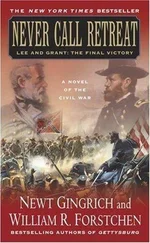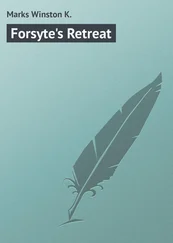McCoy had a gut feeling their prisoner was an intelligence officer, and probably an important one.
"Untie the skinny Slope, hand him a white flag, and send him over the hill," Zimmerman said.
"That would be a violation of the Geneva Convention," McCoy said. "It's against the rules to endanger a prisoner."
"Shit," Zimmerman said.
"Besides, I really want to talk to him," McCoy said.
"Killer, that Slope sonofabitch isn't going to tell us a goddamn thing," Zimmerman argued.
"I think maybe he will when he sees we're back in Seoul," McCoy said.
Zimmermann snorted.
"Sergeant Jennings, hoist the colors," McCoy said.
"Sir?"
"Unstrap the antenna on the jeep. Let's get the flag out so our friends at the roadblock can see it," McCoy clarified.
"Aye, aye, sir."
"What are you going to do?" Zimmerman asked, as Jennings scurried down the hill.
"Drive the jeep to the crest of the hill, and then—very quickly—get out of it, and the line of fire. Whereupon, the Army will—or will not—fire upon it. If they don't fire on it, I will ask for a volunteer to expose himself. We may get lucky."
"And if we don't?"
"Then I guess you get shot. You were going to volunteer, right?"
"Shit," Zimmerman said, smiling.
"I'll do it, Ernie," Major McCoy said.
Marine majors do not ordinarily address their subordinates by their first names, and certainly not with the affection McCoy had in his voice. But there is always an exception. In this case, the two had been friends since 1940, when both had been in the 4th Marines in Shanghai.
They watched as Jennings untied the whip antenna on the jeep. It sprung erect, but there was no breeze and the flag hung limply.
"We could give Dunston a call in Seoul," Zimmerman said. "He's got somebody sitting on his radio."
"How long would it take, Ernie, for Dunston—even if he was sitting on the radio himself—to get a message to that roadblock?" McCoy asked, patiently. "Hours, anyway."
Zimmerman shrugged, taking McCoy's point.
Jennings got behind the wheel of the jeep, put it in four-wheel drive, and started up the hill.
McCoy got to his feet and waited for him. When he got close, McCoy signaled him to stop.
"I'll take it out there, Major," Jennings said.
McCoy jerked his thumb, ordering Jennings out of the jeep, then got behind the wheel.
Then he put it in gear and drove it slowly to the crest and over.
"Shit!" Zimmerman said when the jeep was out of sight.
Two minutes—two very long minutes—later, McCoy reappeared on foot at the crest of the hill.
"I waved and some doggie waved back at me," he announced. "I think we're all right. I'm going to drive down there. I'll signal you with a flashlight when it's okay to come."
"Permission to speak freely, sir?" Technical Sergeant Jennings said.
McCoy made a let's have it gesture with both hands. I should drive the jeep, not you."
"He's right," Zimmerman said.
McCoy thought it over, then jerked his thumb for Jennings to come up the hill.
When he came to McCoy, Jennings handed him his rifle. Then he raised his arms over his head and waved to them as he approached the crest, and disappeared over it.
McCoy stood on the crest with his hands on his hips and watched as Jennings eased the jeep down the hill, then onto the dirt road. When Jennings got close to the roadblock, he suddenly stopped the jeep and raised his hands over his head.
McCoy raised his binoculars to his eyes to see what was going on.
Jennings got out of the jeep and walked the last fifty yards to the roadblock, then disappeared from view behind one of the Sherman tanks.
He was out of sight for five minutes, then reappeared, making a nonregulation but clearly understandable sign that it was all right for everybody else to come in.
Chapter Two
[ONE]
Thirteen Miles South of Suwon, South Korea
1725 28 September 195O
Captain John C. Allen III, a somewhat plump, pleasant-faced twenty-seven-year-old who was commanding officer of Company C, 1st Battalion, 27th Infantry, 7th Infantry Division, was hesitantly pleased with his current mission, the establishment and operation of a roadblock on a road south of Suwon.
You never knew what the hell was going to happen next in the Army; disappointment, sometimes bitter, was always just around the corner.
He had been told—and he had believed—that it would be days, perhaps weeks, before he actually had to face the enemy. The landing of X Corps (the 1st Marine Division and the 7th Infantry Division) at Inchon had severed the enemy's supply routes to the south. Without supplies, the North Koreans could not maintain their attack on the Pusan Perimeter. The Eighth U.S. Army had already counterattacked, broken out of the perimeter, and was driving the enemy northward.
There was still heavy action around Seoul, but most of that was being fought by the 1st Marine Division. Allen thought that the brass had at least enough sense to realize that the 7th Division really was in no shape to fight anybody.
Any military unit needs training to be effective. It was Captain Allen's professional judgment that none of the platoons in his company had adequate training. Neither had any of the companies in the 1st Battalion, any of the battalions in the 27th Infantry, nor any of the regiments in the 7th Division.
It was also Captain Allen's professional opinion that if the 1st Marine Division hadn't performed so superbly—if it had taken a licking—the 7th Division would have really gotten itself clobbered.
Captain Allen was perfectly happy to form—and to sometimes offer to select individuals, such as First Sergeant Grass—professional opinions about the military, although he was not a career officer, had not graduated from the United States Military Academy at West Point, nor, for that matter, attended the company-grade officers' course at the Infantry School at Fort Benning. He hadn't even gone to Officer Candidate School.
Drafted at twenty during World War II, "Jack" Allen had joined the 26th Infantry of the 1st Infantry Division in North Africa. By the time The Big Red One was training to land on the beaches of Normandy, it was Staff Sergeant Allen. On D—Plus Three, in Normandy, it was twenty-one-year-old Second Lieutenant Allen, holder of the Silver Star and directly commissioned after taking over the company when the officers had all been either blown away or wounded.
When war in Europe was over, Captain Jack Allen, who had added two Bronze Stars and two Purple Hearts to his Silver Star, had been one of the very first officers returned to the United States under the Point System for separation.
At Fort Dix, he had made the mistake of believing the Adjutant General's Corps major, who had told him that if he kept his commission in the reserve, he wouldn't be recalled to active duty unless and until enemy tanks were rolling down Pennsylvania Avenue toward the White House.
Jack Allen, star salesman and heir apparent to the throne of J. C. Allen & Sons Paper Merchants, Inc., Philadelphia, Pennsylvania, had received a telegram from the Adjutant General of the United States Army on 9 July 1950, ordering him to report within seventy-two hours to Camp Indiantown Gap, Pennsylvania, there to enter upon extended active duty for the duration of the present conflict, plus six months.
At Indiantown Gap, there was just time enough to buy uniforms and have his shot record brought up to date before being loaded on a battered Douglas C-54 and flown to Fort Lewis, Washington. Three days after arriving at Fort Lewis, he boarded a brand-new-looking Lockheed Constellation of Trans-Global Airways and was flown to Tokyo via Honolulu and Wake Island.
Читать дальше












